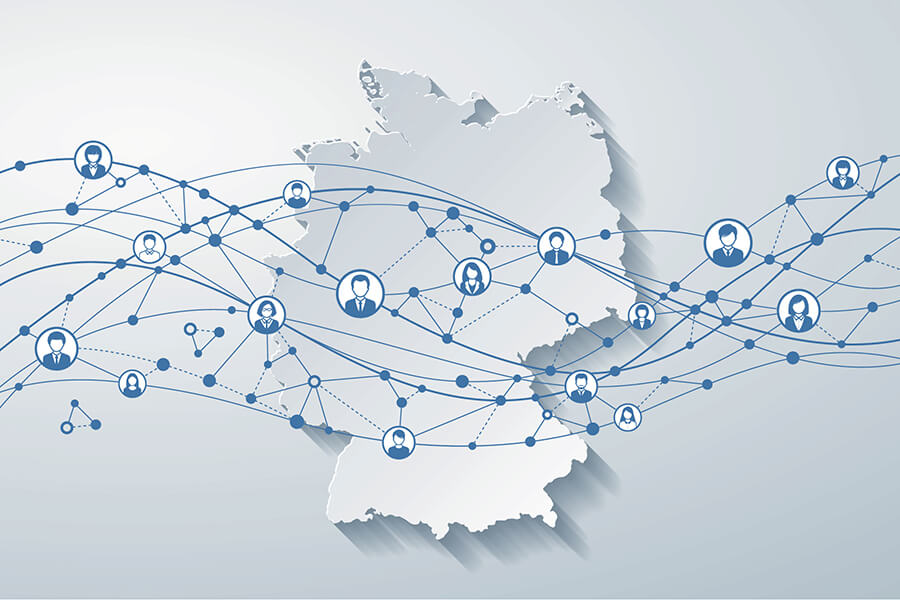PROJECT
Background information on the Open Data project
In the long run, the cross-border availability of high-quality tourism data is essential if Germany, as a tourist destination, is to maintain and expand its position and compete internationally. By opening up data and engaging in a cross-border and cross-organisational dialogue, service providers and DMOs can position themselves along the value chain that has changed as a result of digital transformation.
Therefore, the expansion of digitalisation in the tourism industry as well as the general promotion of digital innovations is a top priority.
The Open Data Project
In order to efficiently use the possibilities of digital technologies – for example artificial intelligence – data must be merged from the different silos, detectable and machine-readable in a consistent structure. With this goal in mind, the state tourism organizations (LTOs), Magic Cities and the GNTB have joined forces to form the Open Data/Knowledge Graph project for Germany as a tourism destination.

© Getty Images/amtitus
Open Data creates the preconditions for the digital transformation towards artificial intelligence. Thus, we are securing Germany as a tourism location, strengthening its competitiveness, and particularly promoting tourism regions as well as digital innovations in tourism and beyond.
Last but not least, we increase the brand presence of the Destination Germany at home and abroad. The objectives in detail:
- Usage of opportunities created by new technologies
- Marketing and branding of Germany abroad
- Securing Germany as a tourism location within its European competition
The project is divided into three sections: audit, design and implementation.
Within the scope of an audit, the current status was analysed professionally and in detail. Data types, content types and technical systems used by the involved partners were examined and evaluated with regard to their usability in a graph database.
In the second section, the conception of the Knowledge Graph for the tourism location Germany was formulated on the basis of technical requirements, statements on operation and quality assurance.
With the conversion, the system is set up technically and the prerequisites for data integration and data export are created. The Knowledge Graph has been accessible to the public since June 2023.
With the implementation of the Open Data/Knowledge Graph project, work is underway with state marketing organizations (LMOs) and Magic Cities to integrate tourism data. Here, the data types relevant for tourism POIs, tours and events are prioritized.
More than 300,000 current data records are currently available. This includes around 200,000 tourist objects (POIs, tours, events, restaurants, hotels, etc.) and a further 100,000 infrastructure data items. The integration of additional partners and data is ongoing.
For an up-to-date overview of the dataset already integrated as Open Data, see the map of Germany.
If you want to search for specific tourist records, please use the search widget.
The project group involves the GNTB, the Landesmarketingorganisationen (federal state marketing organisations) and the Magic Cities. The GNTB is Germany’s national tourist board promoting Germany as a travel destination abroad on behalf of the Federal Government. All over the world, the GNTB promotes Germany’s touristic diversity and thereby one of the biggest and most attractive brands – Germany as a travel destination.
Marketing at federal state level is the responsibility of the respective LMO (federal state marketing organisation) as well as the regional bodies established under them. The Magic Cities Germany marketing organization is also involved in the project. They have joined forces to promote the ten largest German cities in selected overseas markets.
DATA CALL
The ODTA
The Open Data Tourism Alliance (ODTA) is an organizational entity that works on the standardisation of semantic data models for tourism information based on the schema.org standard. For this purpose, so-called “Tourism Domain Specifications” are to be defined and made available via a corresponding platform.

© Getty Images/Ani_Ka, Getty Images/bgblue
In order to promote standardization and thus digitization in European tourism across countries, the GNTB initiated an organizational unit with a European focus in 2021.
The Open Data Tourism Alliance (ODTA) takes care of the cross-border standardization of semantic data models for tourism information based on the schema.org standard. It also ensures cross-national exchange to share experiences in the use of structured data and semantic technologies, e.g. in the context of voice search.
Through their broad positioning, the ODTA partners should not only react to technological developments, but actively help shape them for tourism.

© Getty Images/Ani_Ka, Getty Images/bgblue
Essential tasks are:
- Standardization of semantic annotations of digital content
- Submission of the extensions to the schema.org consortium
- Exchange of content regarding tourism products and services based on Open Data
At launch, ODTA’s membership is comprised of National Tourist Boards as well as state-level partners.
Admission of further members is possible any time.

© Getty Images/Ani_Ka, Getty Images/bgblue
The National Tourist Boards of Germany, Austria, Switzerland and Sweden and 20 partners at the federal level are currently involved in ODTA.
Discussions on the expansion of ODTA are being held with tourism organizations of Great Britain, Belgium and France.
Technical partners can be associated via a separate committee.



